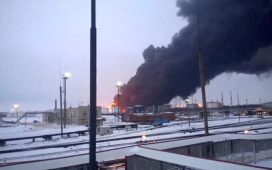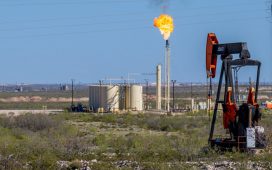Mike Pompeo, U.S. secretary of state, speaks during a press briefing at the State Department in Washington, D.C., U.S., on Thursday, June 13, 2019. The U.S. blamed Iran for attacks on two oil tankers near the entrance to the Persian Gulf on Thursday as the incidents stoke fears that high-stakes diplomatic efforts won’t avert a military confrontation between the U.S. and Iran. Photographer: Andrew Harrer/Bloomberg
© 2019 Bloomberg Finance LP
Most people think of an oil crisis as a major loss of oil supply from some political event which creates a shortage, leading to gasoline lines, a scramble for supplies, and soaring prices. Such has not really occurred since 1979, leading to a fair amount of complacency; as the recent tanker attacks in the Persian Gulf resulted in a minor blip in oil prices. Many pointed to the 1980s Tanker War between Iran and Iraq, which had no noticeable effect on prices as informative.
But when I was a boy, we had real oil crises. (Barefoot, uphill, in the snow, both ways) The 1979 Iranian Revolution saw not just a huge surge in prices, but massive upheaval in the industry’s structure. Within a couple of years, not only had prices tripled, but the dominant role of the Seven Sisters (BP, Chevron, Exxon, Gulf, Mobil, Shell and Texaco) was greatly diminished. Most exporters took over the task of selling their own oil and many consuming nation governments began buying directly from state-owned oil companies.
The forgotten element in all this was hoarding: from early April to end September 1979, OECD inventories rose by 500 million barrels, the most rapid increase in history. This despite the fact that by April 1979, supply had returned to normal: Iran’s production was partly restored and other countries, especially Saudi Arabia, replaced the lost volumes. The implication is that for six months or more, over 3 million barrels a day was removed from the market and placed into storage; without that, prices would not have risen significantly. (The 1990 Gulf War I saw a 50% increase, for example, versus the 300% in 1979/80.)
That there has not been a similar inventory build since then owes, in part, to the much more flexible market. Although there are no precise estimates, about one-third of the world’s oil trade is sold on the spot market instead of long-term contracts. In the 1970s, the amount of oil sold on the spot market was small, around 5%, and during the Iranian Oil Crisis, spot oil dried up as uncertainty led to sellers holding on to all supplies. In the 1990 Gulf War, buyers who lost supply were mostly able to scoop up spot barrels.
Uncertainty is a major reason for hoarding and explains why it is effectively rational behavior and thus hard to regulate. People in a lifeboat with a limited supply of food who don’t know when they will be rescued ration or hoard their food. Similarly, an oil refinery without a steady supply, or receiving oil from an unreliable source (think of the present Libyan situation), will tend to keep more inventory on hand to cope with fluctuations in supply.
The occasional tanker attack is unlikely to move prices and the other extreme, major, damaging attacks on oil fields, could natural send them soaring. But additionally, even a low level of violence whose duration and intensity is uncertain, could mean all levels of the industry trying to retain the maximum number of barrels. Without much spare capacity, this demand would put unrelenting pressure on the price. Similarly, if producers like Saudi Arabia are unwilling to produce barrels that they know will just go into storage, as in 1979, then prices will shoot up.
A wild card in all this is the much greater role of national oil companies both as importers and overseas producers. In 1980, oil imports to China and India were less than 1% of traded oil, while the U.S. was close to 20%; now, China and India import about one-quarter of traded oil, while the U.S. share is below 10%. Since both Chinese and Indian imports are largely controlled by state-owned firms, it can be assumed that they will tend to hold on to any oil they have in a major crisis, rather than balancing the market as international oil firms (mostly) did in 1973 and 1979. Recall that many governments in 1979, including the U.S.’, encouraged oil companies to maximize supplies to their citizens, disregarding agreements to share oil with allies during crises.
Further, Chinese companies are producing about 2 mb/d overseas at present. Some of that might be sold off into the spot market or swapped to take advantage of arbitrage opportunities, but in another oil crisis, the government seems likely to discourage its firms from releasing any oil onto the open market.
Overall, there is always a danger of hoarding creating (or responding to) a panic and sending prices far above what the market balance would justify in a crisis, and it’s not clear if importing governments would deploy their strategic reserves effectively. (They have not in the past; subject for another post. See also the recent EPRINC paper by John Shages.) Past discussions with policymakers that I’ve been part of usually ended inconclusively, especially as the presence of importing national oil companies was still minor. It might be time to revisit the question.








